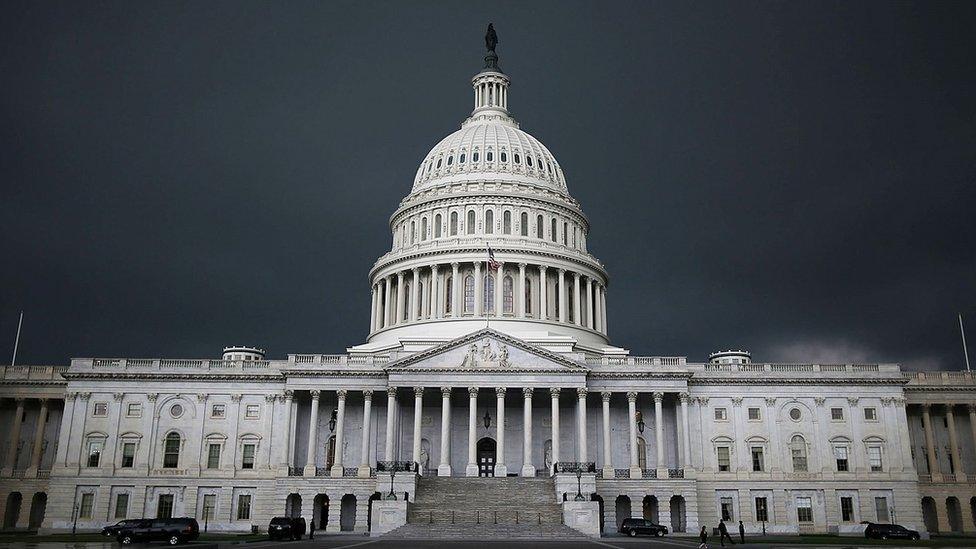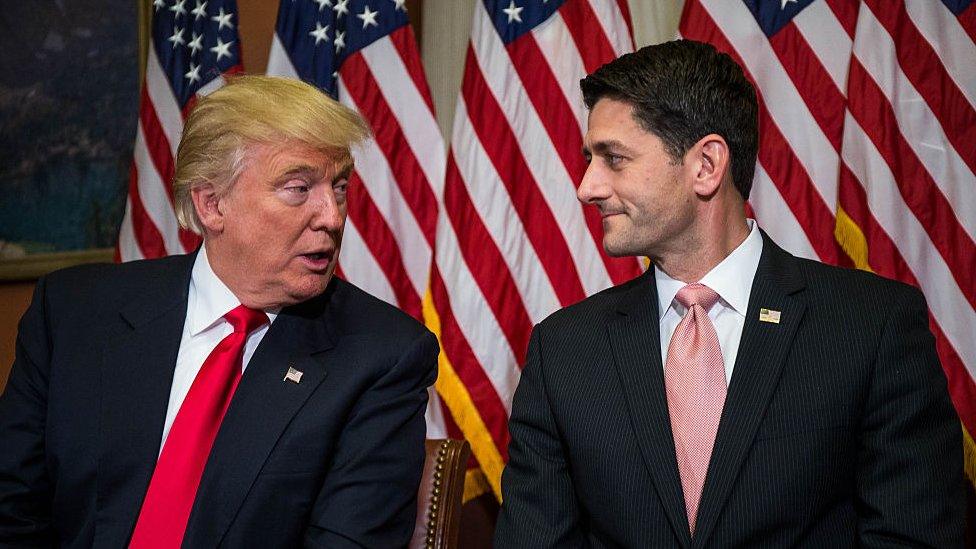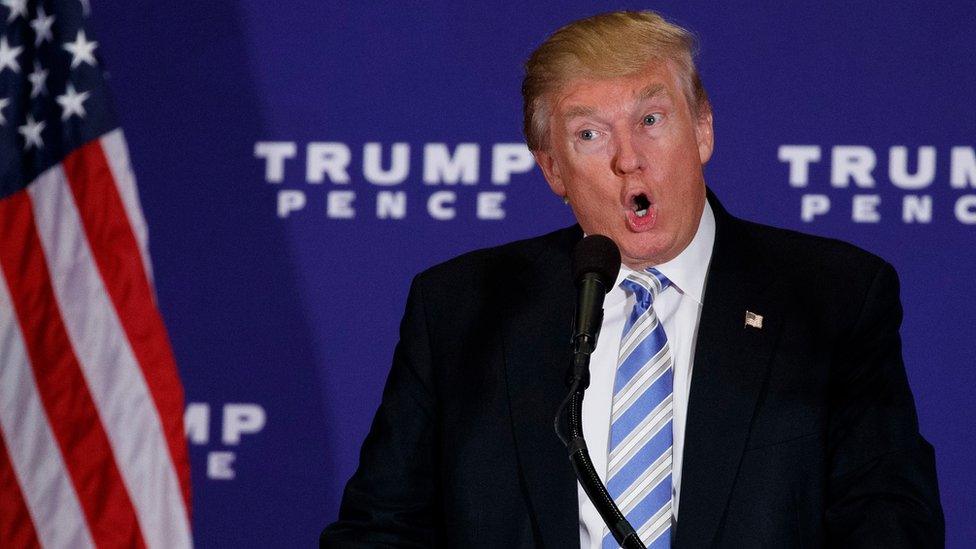Seeds of a Trump-Republican conflict
- Published

With just days to go before inauguration, Donald Trump is making life rather difficult for his party's leadership in Congress.
It could be by accident. It could be part of a plan to establish his independent credentials. Or it could simply be an early attempt at framing Republican policies in terms palatable to his working-class supporters.
Whatever the reason, Mr Trump has staked out positions that are not exactly in harmony with Republican orthodoxy or the policy direction in which the Republican-led Congress seems to be heading.
Better than Obamacare
Over the weekend Mr Trump told the Washington Post, external that the goal of his healthcare reform plan, following repeal of the Affordable Care Act, is "insurance for everybody".
"There was a philosophy in some circles that if you can't pay for it, you don't get it," the president-elect said. "That's not going to happen with us."
Universal coverage is an objective President Barack Obama's healthcare reform sought, but never actually achieved. According to the federal government, even with full implementation of Obamacare and its insurance-coverage mandate, the US uninsured rate was 8.6% in 2016 - albeit a 50-year low.
"Insurance for everybody," outside a single-payer government-provided healthcare plan, is virtually unachievable.
This is why, when Republican congressional leaders describe their healthcare reform proposals, they generally use the term "universal access" not "universal coverage".
"Our goal here is to make sure that everybody can buy coverage or find coverage if they choose to," a Republican House of Representatives aide told reporters, external in December.

Donald Trump and House Speaker Paul Ryan may not see eye-to-eye on universal healthcare coverage.
The yet-to-be announced plan congressional Republicans are currently formulating is more likely to be a blend of the measures floated by various conservatives in the past.
For instance Congressman Tom Price, Mr Trump's nominee to be health and human services secretary, suggested a system that leaned heavily on tax credits and an expansion of existing health-savings accounts, where individuals could put aside untaxed money to pay for future medical needs.
Speaker of the House Paul Ryan has proposed, external the creation of federally funded high-risk insurance pools that would enrol individuals who couldn't get insurances elsewhere because of pre-existing medical conditions or other complicating factors.
None of these would come close to approaching universal coverage or even Mr Obama's uninsured mark over the past few years, however.
As if that weren't enough, Mr Trump also advocated using the buying power of the federal Medicare prescription-drug programme for the elderly to drive down the cost of pharmaceuticals.
While this has long been a goal of Democrats, conservatives have opposed the idea for more than a decade. It's enough to make rank-and-file Republicans reach for their antacids.
Looming over this entire discussion is a Congressional Budget Office report, external released on Tuesday that predicts a straight-up repeal of Obamacare without any kind of a replacement would result in a doubling of premiums in the individual insurance market by 2026, at which point a total of 32 million Americans would have lost their coverage.
Mr Trump, in his comments this weekend, has essentially laid down a marker that repeal will be quickly followed by a replacement that will do a better job advancing Democratic goals of lower drug prices and more universal coverage than the Democrats' own best attempt.
It is, to put it bluntly, a high bar to reach.
A simple tax plan
If reshaping the US healthcare system turns out to be a challenge, at least tax reform was considered a low-hanging fruit for Mr Trump and his party. Even here, however, the president-elect has made comments that undermine Republican efforts to achieve legislative consensus.
A key part of the nascent congressional tax plan involved something called "border adjustments", which would tax corporations based on their final point of sale and not on where they are based. This would allow the US to give preference to businesses based in the US - one of Mr Trump's key goals during the campaign. It would also raise enough revenue to allow the overall US tax rate to be lowered from its current 35% mark.

Donald Trump doesn't want a "complicated" tax reform plan
Mr Trump, however, said the idea was "too complicated".
"Anytime I hear border adjustment, I don't love it," he said. "Because usually it means we're going to get adjusted into a bad deal."
Mr Trump appears to support a more direct border tariff, not the more complicated congressional work-around. On Monday he threatened European automakers with a 35% tax on foreign-made vehicles sold in the US.
The problem this presents for both the president-elect and congressional leaders is it runs directly against his party's long-standing free-trade positions - principles many in Congress have campaigned, and won, on for years. They might be able to dance around the issue with border adjustments and corporate tax reform, but Mr Trump seems more like a bull than a ballerina.
'Congress can't get cold feet'
It's possible to imagine that Mr Trump's recent comments were just, to put it delicately, rhetorical missteps and that he, in fact, is actually on the same wavelength as his Republican colleagues in Congress.
Then again, when pressed by the Washington Post on how he could get his healthcare priorities advanced despite an apparent conflict with current Republican plans, Mr Trump dug in his heels.
"The Congress can't get cold feet because the people will not let that happen," Mr Trump said.
"I think we will get approval. I won't tell you how, but we will get approval. You see what's happened in the House in recent weeks."
That was an apparent reference to Mr Trump's Twitter-based effort to force House Republicans to back away from a plan to weaken an independent congressional ethics investigation office several weeks ago.

Donald Trump says "the people" won't let Congress back away from his ideas
Whether he was directly responsible for causing the legislators to change course or simply reflecting popular outcry is open to debate, but the president-elect seems to be feeling his oats.
And if it's this way on tax law and healthcare reform - areas where Republicans and Mr Trump have a fair amount of ideological common ground - imagine what might happen when the president tries to advance his more controversial ideas on immigration or trade. Or pushes his childcare proposal, which met with significant opposition from his party "allies" pretty much from the moment he proposed them last October.
And what's in store if Mr Ryan goes through with his long-sought dream of entitlement reform - despite Mr Trump's campaign pledges not to touch Medicare or Social Security benefits?
Candidate Trump was a political wild-card, willing to buck conventional wisdom and his own party seemingly on whim.
Early indications are President Trump could do more of the same. As Republicans celebrate this weekend, storm clouds may be forming on the horizon.
- Published7 December 2016
- Published22 October 2016
